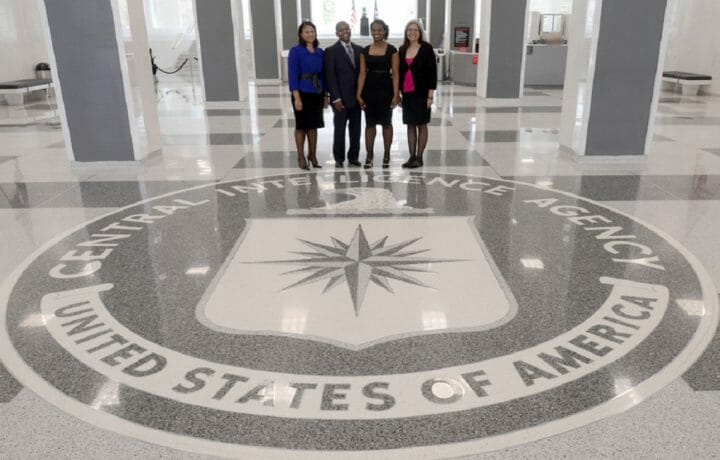When you think of the Central Intelligence Agency, you might picture the infamous characters of Jason Bourne or Ethan Hunt. But the CIA isn’t a group of spies taking down international bad guys in a blaze of gunfire and explosives; the agency is made of several directorates with the responsibility to provide national security intelligence to U.S. policymakers, its website explains.
(As ClearanceJobs recently discussed, the media has often misrepresented the CIA; and in 1976, President Gerald R. Ford condemned the CIA for its previous assassination attempts and orders.)
CIA employees might analyze all-source intelligence and produce informative reports; develop scientific solutions for problems; provide medical services; create cutting-edge digital and cyber tradecraft; and, yes, they may work in a clandestine capacity to collect international intelligence.
If you’d like to work for the agency, in any capacity, then here is everything you need to know.
What it’s like to work at the CIA
The CIA’s “highest organizational values are service, integrity, excellence, courage, teamwork, and stewardship, and we value diversity in all that we do,” according to an email sent from the CIA’s office of public affairs. “To the extent that an ideal candidate exists, that person would exhibit all of these. Also, those interested in intelligence ought to be comfortable working outside the limelight—and, in some cases, also keeping the fact of their employment private.”
Former CIA employee Christopher Burgess—who worked for the CIA for more than 30 years in multiple directorates—told ClearanceJobs that “while the work was significantly different from directorate to directorate, the mission—collecting and providing foreign intelligence to the policy makers of the United States—was always at the forefront” of every job he held in the agency.
What you need to apply
No matter your job at the CIA—including student internships and fellowships—you will need a Top Secret clearance with full-scope polygraph, according to the CIA’s office of public affairs.
Most, though not all, CIA jobs require a bachelor’s degree. “Graduate degrees are not required for most positions, nor are they necessary to have a successful CIA career,” the email states.
The CIA also looks for certain skills in job candidates: “For some positions, particularly in the clandestine arena, foundational skills such as critical thinking, teamwork, and interpersonal abilities are more important than a specific area of study or expertise,” according to the email.
What’s more, no matter the position for which you’d like to apply, “the two most important attributes of a successful candidate are candor and patience,” the email states. “Because CIA employees are given access to some of the nation’s most sensitive secrets, it is imperative that they be of good character, abide by the law, and have no compromising foreign associations.”
Perhaps unsurprisingly, the CIA deeply investigates its applicants, and asks them to disclose a significant amount of their backgrounds during the interview process. That transparency doesn’t end with a job offer. “This extends beyond hiring throughout officers’ careers,” according to the email, adding, “candidates must be comfortable with this and willing to be candid at all times.”
The hiring process can be lengthy: “Patience is key because the process generally takes a long time—often more than a year from extension of job offer to coming on board,” the email states.
While the CIA knows the current process is lengthy, it’s actively looking for ways to speed up the onboarding process – including using software to better communicate with applicants, and find individuals with targeted skills who may not have considered the CIA as an employer.
“Change is very hard inside of a bureaucracy, and it’s doubly hard inside a bureaucracy where secrecy and security is paramount,” said Terri Randall, speaking at the recent #NatSecGirlSquad conference in Washington, D.C. “How can we speed up our process – which is extensive and intensive – with tools that are more user friendly?” She noted these are questions the CIA is asking. It carefully considers its application process, and takes onboarding seriously, in part because once the CIA makes a hire, they hope they’ve found an employee for life, says Randall.
In-demand jobs
According to the CIA’s office of public affairs, the agency receives more applications that can be accommodated, across most of its directorates. However, “the CIA is always looking for well-qualified candidates, especially those with a background in science, technology, medicine, and some other niche fields,” the email states. In a way that may seem cliche, but is actually true, the CIA is looking for people with ‘a very particular set of skills’ – not necessarily the kind that can kill you in fourteen ways, but a diverse mindset that can see a problem from fourteen different angles. And at some point in the very near future, don’t be surprised if rather than waiting for applicants to come to them, a CIA recruiter is contacting you.
“I would like us to find you – using the power of data,” noted Randall. “To help us target people with unique skill sets.”




